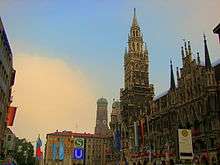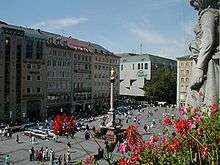Marienplatz


Marienplatz (en: Mary's Square, i.e. St. Mary, Our Lady's Square) is a central square in the city centre of Munich, Germany. It has been the city's main square since 1158.
Architecture
Marienplatz was named after the Mariensäule, a Marian column erected in its centre in 1638 to celebrate the end of Swedish occupation. Today the Marienplatz is dominated by the New City Hall (Neues Rathaus) on the north side. The Glockenspiel in the tower of the new city hall was inspired by these tournaments, and draws millions of tourists a year. At the east side Munich's Old City Hall (Altes Rathaus) is located. It's a gothic council hall and ballroom and tower, which have been reconstructed.
In the Middle Ages, markets and tournaments were held in this city square.
The pedestrian zone between Karlsplatz and Marienplatz is a crowded area with numerous shops and restaurants.
The Marienplatz S-Bahn and U-Bahn station, an important transportation hub, is located below the square.
Mary's Column

The Mariensäule is a Marian column located on the Marienplatz in Munich, Germany. It was erected in 1638 to celebrate the end of Swedish occupation during the Thirty Years' War and is topped by a golden statue of the Virgin Mary standing on a crescent moon as the Queen of Heaven, created in 1590. The figure was originally located in the Frauenkirche. Mariensäule in Munich was the first column of this type built north of the Alps and inspired erecting other Marian columns in this part of Europe.
At each corner of the column's pedestal is a statue of a putto, created by Ferdinand Murmann. The four putti are each depicted fighting a different beast, symbolizing the city's overcoming of adversities: war represented by the lion, pestilence by the cockatrice, hunger or famine by the dragon and heresy by the serpent.
Christmas Market
Three weeks before Christmas the Christkindlmarkt opens at Marienplatz and other squares in the city, selling Christmas goods and food and drink.
Coordinates: 48°08′14″N 11°34′32″E / 48.137271°N 11.575545°E